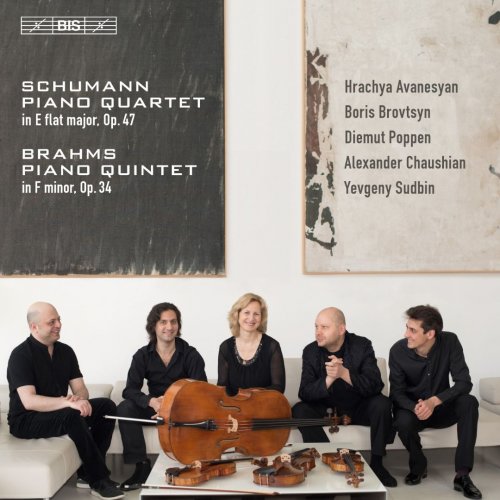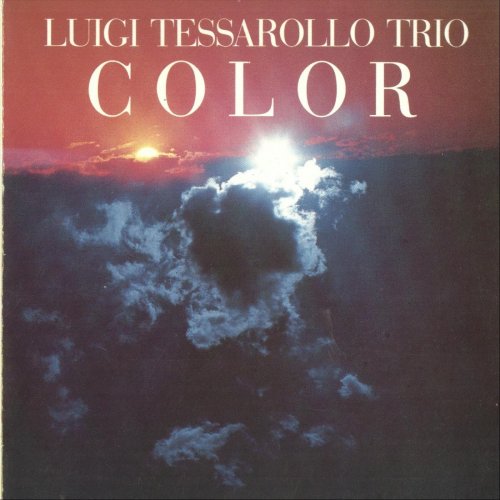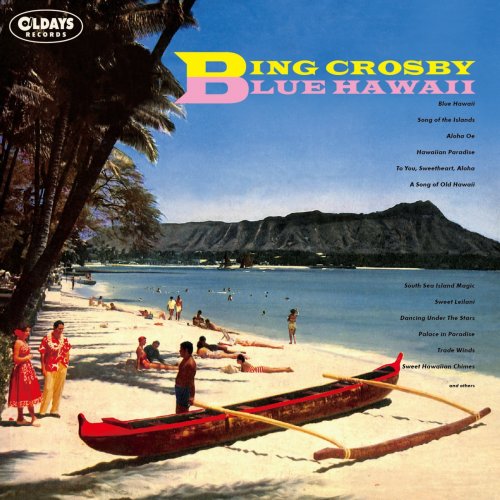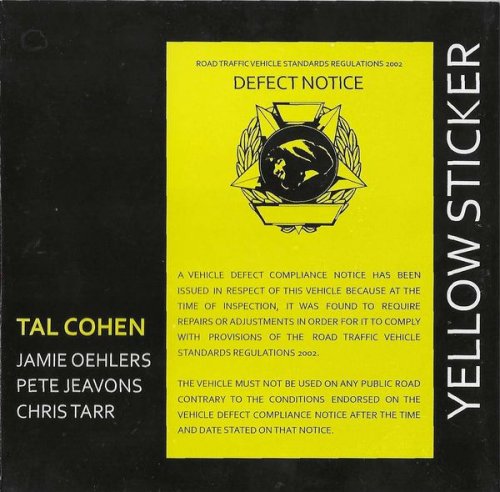Avanesyan, Brovtsyn, Poppen, Chaushian & Sudbin - Schumann: Piano Quartet, Op. 47 - Brahms: Piano Quintet, Op. 34 (2017) CD Rip

Artist: Hrachya Avanesyan, Boris Brovtsyn, Diemut Poppen, Alexander Chaushian & Yevgeny Sudbin
Title: Schumann: Piano Quartet, Op. 47 - Brahms: Piano Quintet, Op. 34
Year Of Release: 2017
Label: BIS
Genre: Classical
Quality: FLAC (image + .cue, log, artwork)
Total Time: 64:32 min
Total Size: 293 MB
WebSite: Album Preview
Tracklist:Title: Schumann: Piano Quartet, Op. 47 - Brahms: Piano Quintet, Op. 34
Year Of Release: 2017
Label: BIS
Genre: Classical
Quality: FLAC (image + .cue, log, artwork)
Total Time: 64:32 min
Total Size: 293 MB
WebSite: Album Preview
Robert Schumann (1810–56)
[1]-[4] Quartet for piano, violin, viola and cello in E flat major, Op. 47 (1842)
Johannes Brahms (1833–97)
[5]-[8] Quintet for piano, 2 violins, viola and cello in F minor, Op. 34 (1864)
Performers:
Yevgeny Sudbin piano
Hrachya Avanesyan violin (Schumann) / violin II (Brahms)
Boris Brovtsyn violin I (Brahms)
Diemut Poppen viola
Alexander Chaushian cello
These two performances derive from a concert given at the 16th International Pharos Chamber Music Festival, Cyprus, in 2016. The performers involved clearly play together regularly, certainly at Pharos, apart from their impressive individual credentials. Some, like Yevgeny Sudbin and Alexander Chausian, have well established partnerships on record. It appears, if the Pharos website is accurate, that the concert was played with a couple of different personnel from these, and certainly this is a studio recording made at the prestigious, if oddly named, The Shoe Factory, not at the original performance venue.
So much for detective work: we have here a group of highly skilled musicians who make music with a rare sense of daring and spontaneity. The tempi they adopt in the 3rd and 4th movements of Brahms' Quintet are noticeably faster than is traditional. So fast are they, that there is a sense of playing to the limit that is very exciting indeed, if a little dangerous. Brahms makes life difficult enough in his unsettling music even before this additional pressure is applied.
Brahms Op.34 Quintet was originally intended for strings, which the composer's friends found "too harsh and dark", according to the notes. He then reworked it for piano duo and then again into the present piano quintet form. It is still a dark and dramatic piece but it would be interesting to know whether it was more so originally. Brahms, however, destroyed the score. Whatever doubts he may have had, posterity has voted firmly in its favour and this is now at the pinnacle of the chamber music repertoire. As a result it has been recorded by everyone and this new SACD is up against some strong competition. The Tokyo Quartet and Jon Nakamatsu on Harmonia Mundi, released in 2012, take a less extreme view of the drama but are enormously satisfying. They are coupled with the Clarinet Quintet. The ancient Berlin Philharmonic Octet recording with Werner Haas, now a Presto CD, stands up extremely well and is a lovely recording despite its age. One could go on. What these musicians have is a bold and upfront recording with a good space around it, such that every strand is clear. It most certainly faces up to the competition with confidence.
The coupling is Schumann's fine Piano Quartet Op.47, a piece one hears rather less often than the Piano Quintet Op.44, but a work very much of Schumann's best. It was written, some twenty years before the Brahms, during the short period in the early 1840s when Schumann wrote many of his finest chamber works. The strong and rhythmic approach of this group works very much in its favour. It does Schumann no good to treat his music gently, he benefits greatly from energy and passion. Listen to any of the recent series from Isabelle Faust and friends, also on Harmonia Mundi, to hear other fine interpretations - incidentally using a period piano, a very nice touch, more should try it.
So a strong and exciting disc from a team who strike sparks from each other. The notes, as always, are full and detailed. The recording, closer than some on BIS, is still excellent. -- Dave Billinge
So much for detective work: we have here a group of highly skilled musicians who make music with a rare sense of daring and spontaneity. The tempi they adopt in the 3rd and 4th movements of Brahms' Quintet are noticeably faster than is traditional. So fast are they, that there is a sense of playing to the limit that is very exciting indeed, if a little dangerous. Brahms makes life difficult enough in his unsettling music even before this additional pressure is applied.
Brahms Op.34 Quintet was originally intended for strings, which the composer's friends found "too harsh and dark", according to the notes. He then reworked it for piano duo and then again into the present piano quintet form. It is still a dark and dramatic piece but it would be interesting to know whether it was more so originally. Brahms, however, destroyed the score. Whatever doubts he may have had, posterity has voted firmly in its favour and this is now at the pinnacle of the chamber music repertoire. As a result it has been recorded by everyone and this new SACD is up against some strong competition. The Tokyo Quartet and Jon Nakamatsu on Harmonia Mundi, released in 2012, take a less extreme view of the drama but are enormously satisfying. They are coupled with the Clarinet Quintet. The ancient Berlin Philharmonic Octet recording with Werner Haas, now a Presto CD, stands up extremely well and is a lovely recording despite its age. One could go on. What these musicians have is a bold and upfront recording with a good space around it, such that every strand is clear. It most certainly faces up to the competition with confidence.
The coupling is Schumann's fine Piano Quartet Op.47, a piece one hears rather less often than the Piano Quintet Op.44, but a work very much of Schumann's best. It was written, some twenty years before the Brahms, during the short period in the early 1840s when Schumann wrote many of his finest chamber works. The strong and rhythmic approach of this group works very much in its favour. It does Schumann no good to treat his music gently, he benefits greatly from energy and passion. Listen to any of the recent series from Isabelle Faust and friends, also on Harmonia Mundi, to hear other fine interpretations - incidentally using a period piano, a very nice touch, more should try it.
So a strong and exciting disc from a team who strike sparks from each other. The notes, as always, are full and detailed. The recording, closer than some on BIS, is still excellent. -- Dave Billinge



![NYO Jazz - Live in Johannesburg (Live) (2025) [Hi-Res] NYO Jazz - Live in Johannesburg (Live) (2025) [Hi-Res]](https://www.dibpic.com/uploads/posts/2025-12/1765894703_zwp14vk90corb_600.jpg)




